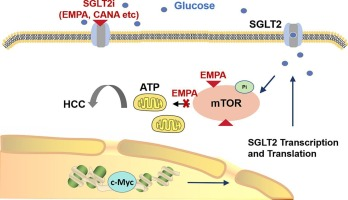adssx
#1466
SGLT2i delays c-Myc-induced HCC progression via targeting mTOR 2025
Network pharmacology, molecular docking analyses, CETSA experiments, and additional western blot experiments were used to reveal EMPA’s interaction inhibition with mTOR.

7 Likes
Chinese paper. Hopefully good work. One thing I found odd, was that they established the presence of tumors by palpating the mice. Seems it would have to be pretty advanced to be felt by palpating. What about small tumors? How does this impact the statistics. I’m curious to see if there’s differential impact from cana vs empa.
That’s a lot of melatonin! When do you take it? Any daytime sleepiness? That dose.reputedly has anti-cancer effects.
adriank
#1469
Melatonin half life is short. Usually doesn’t stay more than 5 hours in your body
1 Like
adssx
#1470
We have a dedicated topic about melatonin: Melatonin megadoses? (And some people here take more than 1,000 mg/day btw)
4 Likes
adssx
split this topic
#1471
3 posts were merged into an existing topic: Melatonin megadoses?
adssx
#1472
Sodium-glucose cotransporter 2 inhibitor partially improves brain mitochondrial function, but does not mitigate cognitive impairment in rats with myocardial infarction 2025
Treatment with SGLT2i and ACEi improved cardiac function but failed to attenuate cognitive impairment, synaptic dysplasticity, and loss of dendritic spine density in MI rats. A decrease in brain glutamate level was found following MI, which can be restored by SGLT2i and ACEi. Surprisingly, only SGLT2i partially improved brain mitochondrial function.
They used dapagliflozin. Interesting @John_Hemming.
6 Likes
Davin8r
#1473
Have we discussed this new paper yet? The results in the abstract are pretty scary:
Conclusion and relevance: No significant effect of SGLT2 inhibitors on nervous system disorders was observed. There was reduced risk for Parkinson’s Disease observed in some specific populations. In addition, the risks of empagliflozin and dapagliflozin concerning syncope and carotid artery occlusion/carotid artery stenosis are worth attention.
3 Likes
adssx
#1475
We discussed it here (and after): Canagliflozin - Another Top Longevity Drug - #1438 by CronosTempi
Chinese paper from a Tier 4 Chinese uni (ranked 201 in China: ShanghaiRanking-Univiersities ). Weird findings. For instance “dementia (RR = 1.29; 95% CI = 0.78-2.12; P = 0.32)” whereas all the papers I saw found a neutral or protective effect on dementia, so unlikely to be 1.29. I would discard the paper entirely.
6 Likes
adssx
#1476
Turkish review: SGLT-2 inhibitors on cardiac autonomic function in individuals with and without type 2 diabetes mellitus 2025
SGLT-2 inhibitors reduce sympathetic overactivity and enhance parasympathetic tone.
SGLT-2 inhibitors boost RMSSD and SDNN and lower the LF/HF ratio.
Use of SGLT-2 inhibitors offers anti-inflammatory, endothelial, and baroreceptor benefits.
Standardized HRV studies and nonlinear analysis required
4 Likes
I wonder if they ever explore how long and at what dose of any given SGLT2i do you have to be exposed to in order to register these various effects. Example, 2 years of 25mg/day empagliflozin results in 0.83 HR for heart failure or whatnot. And so on for each effect. It stands to reason that the time of exposure will differ for various effects. I also wonder if the time is different for diabetics and nondiabetics.
1 Like
Neo
#1478
Did your HRV change after starting SGLT2i?
Anyone else have the before after date on that?
adssx
#1479
Unfortunately I don’t have the before/after. But @Davin8r ran the test the other way around: Canagliflozin - Another Top Longevity Drug - #1295 by Davin8r
1 Like
Neo
#1480
Can you look back at your HRV to see if it changed when you first started emp also?
@RapAdmin - I believe you cycle on and off sglt2i, do you see anything in your HRV data?
Davin8r
#1481
Sorry, I don’t have the dates dialed in. The difference objectively was mild since I still had (and have) elevated HR and lower HRV while on low dose tirzepatide despite also being on 25mg empagliflozin daily. The subjective difference was much more profound, for whatever reason. Once I got back on empa, my HR was no longer noticeable, no palpitations or anxiety.
3 Likes
Davin8r
#1482
And this from Lustgarden this morning. Hopefully there isn’t a long-term trade-off between health benefits of incretin mimetics vs the side effects of elevated HR:
6 Likes
I’ll add that it appears that GLP-1s directly cause the heart to beat faster, as opposed to some other effect eg via the autonomic nervous system.
Also note that Ivabradine does not typically have a heart rate lowering effect beyond 60 bpm. So for many health conscious people, it’s not a viable option for further reducing heart rate.
I’m glad he points out that we don’t know if heart rate change itself is causal vs some other related system, eg autonomic function. We do have MR studies that show lower heart rate is better, but I’m not sure if those studies definitively show that lowering (or increasing) heart rate directly via GLP-1s or Ivabradine or beta blockers would have an effect on mortality.
7 Likes
Beth
#1484
On that note… I’ve been curious about other people’s sleeping heart rates
I think mine is on the high side. According to Oura, my average overnight HR is almost always in the 60s. I’ll have nights here or there in the 70s, but usually it’s been in the mid to high 60s. Over the last month, it dropped to lower 60s, but this week it’s up again.
1 Like
Mine moves around depending on lots of things many of which are predictable. Last night’s fitbit average sleeping HR was 50, it sometimes goes lower. However, post binge drinking it will be in the 60s and 70s.
1 Like